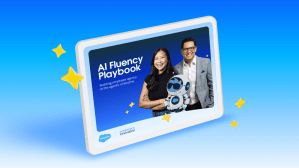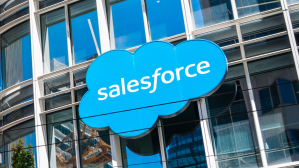Key Takeaways
- Grounded in the 4,000-page Harmonized Tariff Schedule, an Import Specialist Agent built with Agentforce can use an organization’s unique business data to do things like adjust pricing and business forecasts in response to changes to the tariff schedule.
- The agent can act and react quickly to show how profit margins change or how a different supplier might be less impacted by tariff policy shifts, ultimately protecting the bottom line.
Navigating the labyrinth of international trade requires the analytical fortitude of a chess grandmaster and the memory of a supercomputer. The Harmonized Tariff Schedule — the system that sets out tariff rates and categorizes goods for U.S. businesses — is a highly complex document with more than 4,400 pages. And this behemoth has already been updated at least a dozen times so far this year.
To stay current with the ever-shifting tariffs landscape, a company might need to employ a small squad of in-house experts, spend a fortune on consultants, or spend months trying to understand and implement changes. But what if there were an AI agent — a type of AI that can understand its environment, make decisions, and autonomously take action — that could serve as a kind of in-house savant? What if it could instantly process changes for all 20,000 product categories in the U.S. customs system and then take action on them to help a business?
In fact, there is such an always-on expert: the Import Specialist Agent, a new type of Al agent made possible by Agentforce. It’s a great example of “digital labor,” an autonomous AI agent that can work alongside people, while executing tasks too complex or time consuming for humans to perform.
And helping an organization navigate the uncertainties and complexities of the contemporary trade environment is just the beginning of this agent’s capabilities. The Import Specialist Agent is powered by the Atlas Reasoning Engine, the “brain” of Agentforce, which means it can process and analyze complex data from multiple sources to make informed decisions, provide predictive insights, and generate actionable recommendations. This includes being able to use an organization’s unique business data to take on a range of autonomous actions to support specific business needs — from identifying and seeking new suppliers, to dynamically adjusting prices, to modeling business forecasts and promotional campaigns based on changes to the tariff schedule.
“You can develop the capabilities for agents to work inside an organization and learn and augment and even autonomously take action,” said Salesforce Executive Vice President of Global Public Sector Solution Engineering Paul Tatum. “It’s revolutionary.”
Agentforce can help businesses and other organizations understand and take action on the complex intricacies of government policies and environments — like reconciling differences between back-to-back tariff adjustments or disparate policies, said Tatum. It can also be imbued with additional capabilities, to help with things like price fluctuations and sales forecasting.
The Import Specialist Agent can help organizations navigate the complex importing process, simplify compliance, and speed up the application process. It can also be set up in just 5 easy steps.
Making sense of complexity
Between January and early May, the U.S. government had already published a dozen revisions to the 2025 Harmonized Tariff Schedule. But good luck making sense of every change to a document with thousands of pages that is written in the bureaucratic language of government and littered with charts and subsections.
Determining whether a tariff applies can hinge on minutiae like weight, quantity, or even if a product is shipped fresh versus frozen. Whether it’s the globe’s largest businesses or small outfits operating on a shoestring budget, successfully navigating this complexity is not just about regulatory compliance — it’s about protecting the bottom line from the volatility of macroeconomics and geopolitics.
Making sense of these intricate frameworks is precisely where AI agents shine. The Import Specialist Agent exemplifies this new generation of digital labor that can ingest, analyze, and put complex data to use at scale, augmenting the human workforce.
“We simply pointed this particular agent at that 4,000-plus page document, and now it’s grounded in that data and able to answer any questions you might have about tariffs and rates,” said Shelby Kivett, Principal Solution Engineer in Salesforce’s Public Sector practice.
We simply pointed this particular agent at that 4,000-plus page document, and now it’s grounded in that data and able to answer any questions you might have about tariffs and rates.
Shelby Kivett, Principal Solution Engineer, Public Sector, Salesforce
Yet what makes this approach particularly powerful is an agent’s ability to merge the Harmonized Tariff Schedule with an organization’s specific business data — pricing structures, supplier relationships, inventory levels, and historical sales patterns.
Salesforce Data Cloud acts as the connective tissue, incorporating information from different sources — like internal apps, external data lakes, emails, images, or PDFs. This provides the AI agent with a complete picture when it generates responses. By integrating customer relationship data, enterprise resource planning figures, and supply chain metrics into a unified platform, the Import Specialist Agent creates a comprehensive visual dashboard that provides real-time intelligence across operations.
The financial implications go beyond the impact of the tariffs themselves. The constant uncertainties about tariff rates ripple through an organization and impact everything from its production schedules and procurement strategies to revenue forecasts and, ultimately, the viability of its business.
Rather than providing generic advice, the Import Specialist Agent can identify trends, forecast impacts, and recommend strategic adjustments unique to each company’s situation. For example, the agent can calculate duties and freight costs, then show how profit margins change as tariffs increase or decrease.
Organizations embracing this proactive, AI and data-driven approach aren’t just saving on consultant fees and hours of headaches — they’re gaining a competitive advantage through bolstered resilience and faster, more informed decision-making. And, because Agentforce has security and guardrails built right in, organizations can define the operational boundaries for each agent, outlining what it can and can’t do, so their actions can be trusted.
The ideal (digital) colleague
What distinguishes agents from earlier generations of chatbots and AI copilots is that they can learn, reason, and take action on their own.
A company’s procurement specialist, for instance, can ask the Import Specialist Agent to show and track the impact of tariffs across its entire product line. Because the company has already loaded its own procurement data into the model, the agent knows the country of origin for every component a company imports, along with its price and the quantity on hand. Because of this, it can recommend ways to reduce the impact of increased fees or find a workaround when a part is delayed because of a shift in tariff policy — like helping to identify a new supplier who isn’t impacted.
But perhaps more importantly, this grounding in a businesses’ unique data also enables the agent to perform tasks autonomously, swiftly taking action as tariff schedules change or a business’s strategy evolves. And, employees can interact with the agent using natural language, just as they would with any colleague.
“You can ask it what products are most impacted by tariff revenues or ask it what the impact would be if you raised the price of a good by 10% percent,” said Tatum. The agent can even join relevant Slack channels across an organization, ensuring that everyone from suppliers to sales to customer service remains aligned on tariff changes and their implications.
The AI agent, in other words, can do in minutes what it would otherwise take a human employee days, if not weeks, to accomplish.
Applicable across industries
Businesses of all sizes and types could benefit from Agentforce Al agents like this, which can be deployed in minutes, will operate continuously, and can be layered on top of existing tools, applications, and systems.
Consider, as Tatum and Kivett did, the case of an entrepreneur just starting off in the avocado import business who has questions about the tariff schedule.
“That entrepreneur is touching so many different agencies and looking at different types of requirements and regulations,” Kivett said. “That’s where Agentforce is super helpful in helping that person understand and decipher all those complex regulations and letting them ask the questions they have.”
That’s where Agentforce is super helpful in helping that person understand and decipher all those complex regulations and letting them ask the questions they have.
Shelby Kivett, Principal Solution Engineer, Public Sector, Salesforce
Or take the case of a steel manufacturer facing supply chain challenges during planning cycles. By integrating the Import Specialist Agent with Tableau — Salesforce’s agentic analytics platform — teams can receive automatic tariff alerts, predictive analytics on disruptions, and data-driven sourcing recommendations.
A retailer might need cost fluctuation insights to maintain profitability amid economic turbulence. The Import Specialist Agent, working with Revenue Cloud, can generate price adjustment recommendations based on tariff data, forecasts demand, and synchronizes pricing across channels.
And an automaker, who might need to strengthen their procurement strategy can integrate the AI agent with Automotive Cloud to predict supplier impacts based on tariff changes and suggest alternative sourcing to minimize disruptions and protect margins.
From idea to implementation
Once a business starts enlisting a digital workforce, it’s crucial to set parameters. What data can an agent use and what are the limits on their powers? Can they disburse funds or make changes to a company’s records? Where will a company’s human employees work with them? In their Salesforce instance? In Slack? The Agentforce platform lets the customer make those decisions.
“The question is no longer a technology question. It’s an executive question,” Tatum said. “What if you can add 10,000 digital experts to an organization that has no budget to hire anybody? What if you had these employees working 24/7? What if they can speak 40 different languages?”
The possibilities seem infinite.
Go deeper:
- Learn more about how to protect your profit margins amid tariff turbulence
- See more of our industry-specific capabilities
- Read more on the Import Specialist Agent in Fast Company (subscriber content)
- Check out this webinar to learn how to build better promotional campaigns in an uncertain economy
- Watch this webinar to see how you can use AI agents to navigate manufacturing industry pressures





















